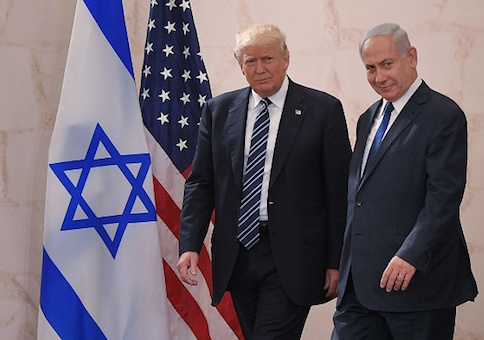The Trump administration is remaining quiet on when it will relocate the U.S. embassy in Israel to Jerusalem amid growing calls from Congress for the administration to enact the policy President Donald Trump repeatedly promised during the 2016 campaign, according to multiple U.S. officials familiar with the matter.
Officials from the White House National Security Council and State Department provided identical statements to the Free Beacon on Wednesday saying there is "no news to share" on when the administration will relocate the U.S. embassy in Tel Aviv to Jerusalem, Israel's capital city.
The standstill comes despite renewed congressional interest in the issue ahead of Dec. 1 deadline for Trump to either begin the process of moving the embassy or delay any action for another six months.
While Trump vowed multiple times on the campaign trail to move the U.S. embassy to Jerusalem—a key priority for the pro-Israel community—as one of his first acts in office, the president decided to formally delay the process as his administration pursues efforts to restart the Israel-Palestinian peace process.
Supporters of Israel in Congress appear to have become increasingly frustrated with the Trump administration's decision to delay the move. The House Oversight Committee's National Security Subcommittee held a hearing on the matter Wednesday in what insiders said is a bid to show the Trump administration that further delay will not be tolerated by many in Congress.
Trump administration officials told the Free Beacon the "President has always made it very clear that it is a matter of when, not if" he choses to move the embassy. However, there is "no news to share at this time" on where the process stands and whether the move will be delayed even further.
A panel of former U.S. and Israeli officials who testified before House lawmakers described this response as lacking and urged the Trump administration to follow through on its promise to relocate the embassy.
"'Not now,' too often means, 'not ever,'" former United Nations Ambassador John Bolton told lawmakers at the hearing. "We should reject that council and move the American embassy to Israel’s capital city."
Bolton dismissed arguments that the move would harm U.S. efforts to foster peace negotiations between Israel and the Palestinians, telling lawmakers the United States must assert its full support for Israel's sovereignty over Jerusalem, which the Palestinians also claim as the capital of their future state.
"Would not adversely effect negotiations over Jerusalem’s final status or the broader Middle East peace process," Bolton said. "Nor would it impair our diplomatic relations among predominately Arab or Muslims nations. In fact, by its honest recognition of reality, shifting the embassy would have an overall positive impact for U.S. diplomatic efforts."
Many of the arguments against moving the embassy are meant to undermine Israel's legitimacy and "deny to Israel the acknowledgement that it is a legitimate state with a legitimate capital."
Bolton, as well as the other witnesses, noted that the United States maintains embassies in several contested capital cities across the globe and has only singled out Israel for special treatment.
"If the peace process is such a delicate snowflake that moving our embassy would destroy it, you have to ask what its viability is to begin with," Bolton said.
Rep. Ron DeSantis (R., Fla.), chair of the House Oversight Committee's national security subcommittee and organizer of the hearing, said U.S.-Israel relations are being harmed by government's refusal to uphold a 1995 law mandating that the U.S. embassy in Israel be moved from Tel Aviv.
"Jerusalem has been the capital of the Jewish people for thousands of years and is the beating heart of the modern Israel," DeSantis said. "Why should we reject the chosen capital city of a close ally."
"Leaders in the Middle East respect a strong horse, and acting with decisiveness to defend American interests and to stand by a close ally is far more preferable to defaulting on a key promise like past leaders have done," DeSantis said.
The Trump administration could take "incremental steps" toward moving the U.S. embassy and recognizing Jerusalem as Israel’s capital. This includes permitted U.S. citizens born in the holy city to list "Jerusalem, Israel" as their birthplace.
U.S. law currently bars the State Department from listing "Jerusalem, Israel" on passports.
Morton Klein, president of the Zionist Organization of America, argued the United States is caving to terrorist demands by refusing to relocate the embassy.
"Delaying implementation sends the message that Islamist threats and terrorism work," Klein said. "But moving the embassy will strengthen American security," and send a message that the United States "will not, dare not, be intimidated by appeasing radical Islamic threats."
Ambassador Dore Gold, who has served several high-level positions in the Israeli government over the years, noted that Israel has done more than any past regime to ensure religious freedom in Jerusalem and protect the city’s holy sites.
"Jerusalem before was a mess," Gold said. Israel has to protect Jerusalem for "all peoples and all faiths."
"Only a free and democratic Israel will protect the holy sites of all the great faiths in Jerusalem," he said.
